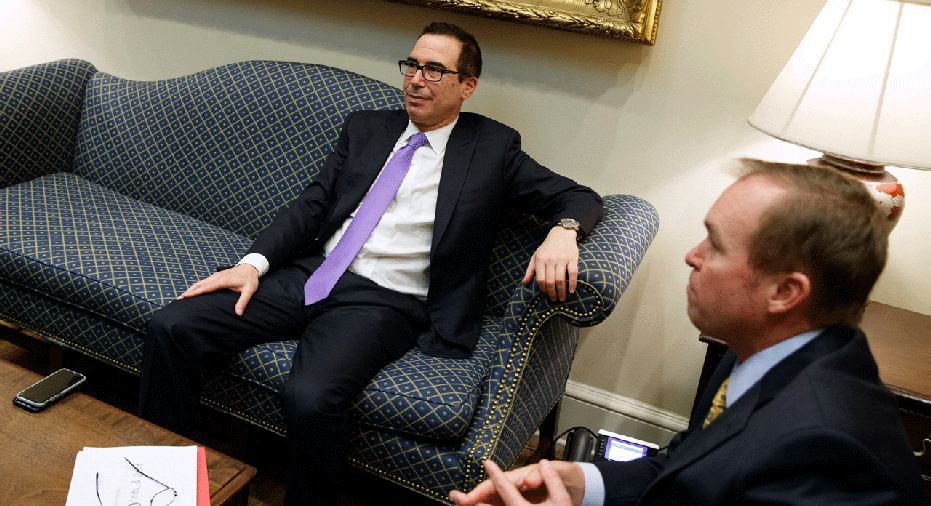White House split over debt ceiling as deadline looms

U.S. Treasury Secretary Steven Mnuchin has repeatedly asked Congress to pass a “clean†debt ceiling bill — with no reforms attached — before the August recess, but Office of Management and Budget Director Mick Mulvaney said Thursday the White House hasn’t decided on a strategy, just over a month before Mnuchin’s recommended deadline.
"There are various thoughts about how to get something passed, but I don't think we've settled on how to move forward yet," Mulvaney told reporters Thursday. "Will it be a clean debt ceiling vote? Will it be a debt ceiling vote with some type of reforms attached to it? I don't think we've settled on that.â€
Conservative Republican lawmakers often try to use the debt ceiling as a way to pass spending reforms. Mulvaney, a known fiscal hawk, has favored attaching riders onto the debt limit increase that would lower future spending. Meanwhile, Mnuchin has insisted countless times on raising the debt ceiling first and passing any related spending measures separately.
“We can all discuss how we cut spending in the future and how we deal with the budget going forward, but it is absolutely critical that where we’ve spent money that we keep the credit of the United States as the most critical issue. It is the reserve currency of the world and we need to make sure that we can raise our debt ceiling to pay our debts,†Mnuchin said during a hearing before a House committee last week.
However, while Mulvaney indicated Thursday that Mnuchin was leading the discussions on debt limit strategy, he said he would “certainly†participate and added that it’s not unusual for there to be disagreement among the Treasury Secretary and OMB Director.
The debt ceiling has been a hot topic on Capitol Hill throughout recent weeks as the government’s ability to pay its bills wears thin. Secretary Mnuchin assured lawmakers, and the listening public, that the government had a “backup plan†should Congress fail to reach a deal before the August recess, during a hearing earlier this week. He said the government could be funded into September, but refused to give a timeframe as to exactly how long funding would last without an agreement among Republicans and Democrats.
A deal will raise the United States’ borrowing authority in order to cover the annual deficit it accrues. President Obama temporarily suspended the debt ceiling until March 2017—since then the government has been paying its bills using “extraordinary measures.†The worry now is how much longer it can sustain those measures, which, as indicated by the administration, appears to be sometime in the early Fall.
A disunited front from the administration could prove problematic for reaching an agreement on the debt ceiling, which tends to be a contentious debate by nature. The government also has a tall agenda for the summer months, including passing a bill to repeal and replace ObamaCare, as well as introducing a formal bill to overhaul the U.S. tax system. The administration has insisted it will have a tax bill by the end of the year, something businesses and the markets have counted on to fuel economic growth.



















